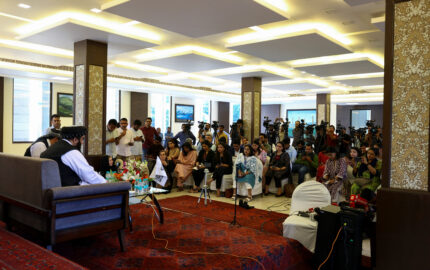I would rephrase the question to be “Can democracy survive journalism as it has come to be practiced?” After all, accurate, trustworthy information, lots of it, is the bedrock of democracy.
Propagandists who pose as journalists, and corporate bosses who encourage them, not only breach a public trust; they are, to put it bluntly, subversive. Whether by blatant lie, partial truth, or opinion masquerading as fact in news reports, modern-day subversion undermines the premise of democracy—an informed electorate. Car bombs are vivid; twisted facts are insidious, therefore more dangerous, even lethal.
Ordinarily I am a stranger to talk radio. Recently I made its acquaintance during a long car trip. I anticipated over-the-top commentary; I did not expect the stunning amount of factual misrepresentation spewing forth equally from callers and the provocateurs who orchestrate the programs. Subversion broadcast across the radio dial in the form of myth, distortion and hearsay-as-fact. I hope fervently it is an exaggeration that a reported 22 percent of Americans get most of their news from talk radio.
My predecessor at The Des Moines Register believed firmly, and rightly, that our mission was to appeal to reason. That meant relying heavily on facts to buttress our positions, and we had the staff to do a great deal of legwork. Opinion was confined rigorously to the opinion pages. Generalizations are tricky, but I’m aware that appeals to emotion are now encouraged through more forceful commentary to boost readership, even as opinion leaches from editorial pages to news columns. Slimmer staffs make fact-finding more difficult. The lead that reports what a candidate says and the motive for saying it are so routine, even at respected papers, that opinionated news seems no longer an oxymoron.
Several years ago I was asked to critique the editorial pages of a major Midwest newspaper. In reading the entire paper for weeks, I found news pages saturated with opinion and front-page stories running side-by-side with a columnist’s hard-hitting take on events. The local columnists outshouted the more measured voice of the institution. My report’s conclusion: The editorial page had lost its franchise to the news side, by a wide margin. Locally written opinion columns are fine in their place—the opinion section. If the op-ed page cannot accommodate them all, nowhere is it written that op-ed material has to be squeezed on a single page. More space might give loudmouths an edge, but readers at least would be spared misplaced opinion.
The wall separating news and opinion needs to be rebuilt and made impermeable and news reports scrubbed clean of attitude. News analysis is valuable when properly labeled and not allowed to edge into opinion. To put it another way, the print press has to go in the opposite direction of electronic journalism to distinguish itself. By doing so, it shows that it plays by its own rules that are good for journalism and representative government that operates by consent of an informed public. But in their quest for ever-harder-to-find readers, print seems to opt for the edgy.
Some 60 years ago, Henry R. Luce, concerned about press freedom in a post-war world, put some $200,000 of Time’s money at the disposal of a Commission on Freedom of the Press, headed by Robert M. Hutchins, president of the University of Chicago. Its 1947 report, “A Free and Responsible Press,” stressed society’s need for a “truthful, (italics added) comprehensive, and intelligent account of the day’s events in a context which gives them meaning” with “the identification of fact as fact and opinion as opinion, and their separation as far as possible.” Such accounts were available then, as they are now. They are not, however, what nourishes many Americans.
The Hutchins Commission examined a press vastly different from today’s. Television, in its infancy, had no cable. It took 20 more years until the first newspaper company to go public, Dow Jones & Co., listed its stock. Consolidation and public ownership have left the press in fewer and more ratings-driven, profit-hungry hands. If trends continue, the subversion of democracy will be rewarded with more lavish compensation and higher stock prices as the political system journalism is supposed to serve is diminished. That is a tragic trade-off.
The report of the Hutchins Commission—which had no journalists as members—was generally derided when not ignored. Needed now is not an examination of freedom of the press but a willingness to address society’s need “for a truthful, comprehensive, and intelligent account of the day’s events in a context which gives them meaning.” That quest is more elusive than ever. Journalism groups and foundations need to join forces to pick up where the Hutchins Commission left off.
Gilbert Cranberg, former editor of The Des Moines Register’s opinion pages, is the University of Iowa’s George H. Gallup Professor Emeritus.
Propagandists who pose as journalists, and corporate bosses who encourage them, not only breach a public trust; they are, to put it bluntly, subversive. Whether by blatant lie, partial truth, or opinion masquerading as fact in news reports, modern-day subversion undermines the premise of democracy—an informed electorate. Car bombs are vivid; twisted facts are insidious, therefore more dangerous, even lethal.
Ordinarily I am a stranger to talk radio. Recently I made its acquaintance during a long car trip. I anticipated over-the-top commentary; I did not expect the stunning amount of factual misrepresentation spewing forth equally from callers and the provocateurs who orchestrate the programs. Subversion broadcast across the radio dial in the form of myth, distortion and hearsay-as-fact. I hope fervently it is an exaggeration that a reported 22 percent of Americans get most of their news from talk radio.
My predecessor at The Des Moines Register believed firmly, and rightly, that our mission was to appeal to reason. That meant relying heavily on facts to buttress our positions, and we had the staff to do a great deal of legwork. Opinion was confined rigorously to the opinion pages. Generalizations are tricky, but I’m aware that appeals to emotion are now encouraged through more forceful commentary to boost readership, even as opinion leaches from editorial pages to news columns. Slimmer staffs make fact-finding more difficult. The lead that reports what a candidate says and the motive for saying it are so routine, even at respected papers, that opinionated news seems no longer an oxymoron.
Several years ago I was asked to critique the editorial pages of a major Midwest newspaper. In reading the entire paper for weeks, I found news pages saturated with opinion and front-page stories running side-by-side with a columnist’s hard-hitting take on events. The local columnists outshouted the more measured voice of the institution. My report’s conclusion: The editorial page had lost its franchise to the news side, by a wide margin. Locally written opinion columns are fine in their place—the opinion section. If the op-ed page cannot accommodate them all, nowhere is it written that op-ed material has to be squeezed on a single page. More space might give loudmouths an edge, but readers at least would be spared misplaced opinion.
The wall separating news and opinion needs to be rebuilt and made impermeable and news reports scrubbed clean of attitude. News analysis is valuable when properly labeled and not allowed to edge into opinion. To put it another way, the print press has to go in the opposite direction of electronic journalism to distinguish itself. By doing so, it shows that it plays by its own rules that are good for journalism and representative government that operates by consent of an informed public. But in their quest for ever-harder-to-find readers, print seems to opt for the edgy.
Some 60 years ago, Henry R. Luce, concerned about press freedom in a post-war world, put some $200,000 of Time’s money at the disposal of a Commission on Freedom of the Press, headed by Robert M. Hutchins, president of the University of Chicago. Its 1947 report, “A Free and Responsible Press,” stressed society’s need for a “truthful, (italics added) comprehensive, and intelligent account of the day’s events in a context which gives them meaning” with “the identification of fact as fact and opinion as opinion, and their separation as far as possible.” Such accounts were available then, as they are now. They are not, however, what nourishes many Americans.
The Hutchins Commission examined a press vastly different from today’s. Television, in its infancy, had no cable. It took 20 more years until the first newspaper company to go public, Dow Jones & Co., listed its stock. Consolidation and public ownership have left the press in fewer and more ratings-driven, profit-hungry hands. If trends continue, the subversion of democracy will be rewarded with more lavish compensation and higher stock prices as the political system journalism is supposed to serve is diminished. That is a tragic trade-off.
The report of the Hutchins Commission—which had no journalists as members—was generally derided when not ignored. Needed now is not an examination of freedom of the press but a willingness to address society’s need “for a truthful, comprehensive, and intelligent account of the day’s events in a context which gives them meaning.” That quest is more elusive than ever. Journalism groups and foundations need to join forces to pick up where the Hutchins Commission left off.
Gilbert Cranberg, former editor of The Des Moines Register’s opinion pages, is the University of Iowa’s George H. Gallup Professor Emeritus.



